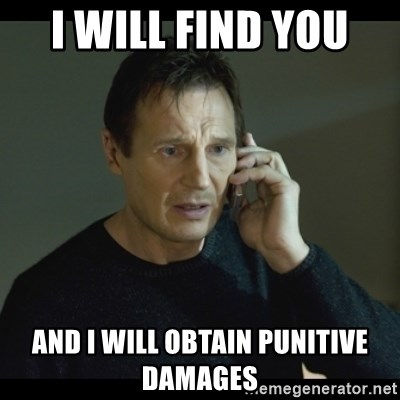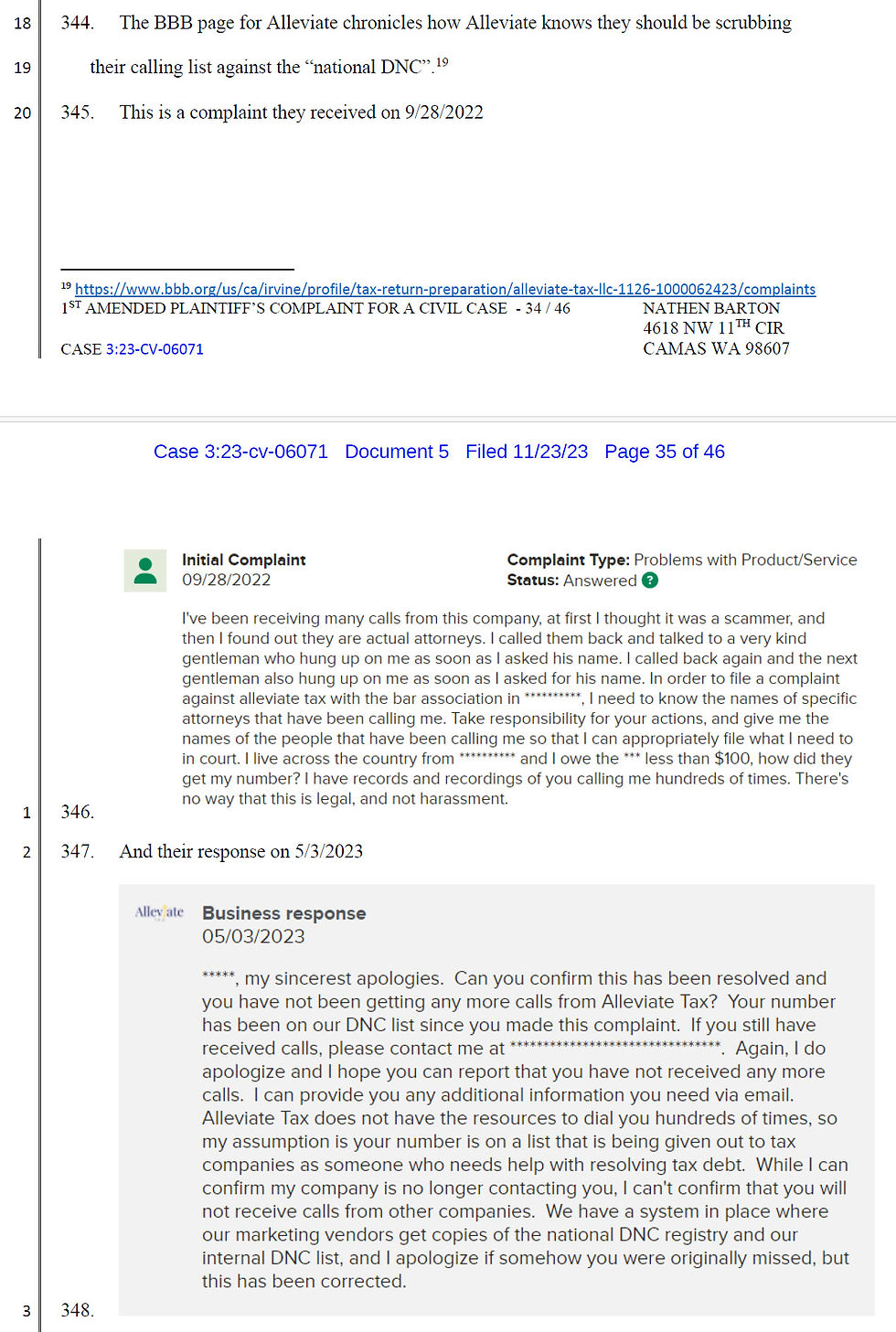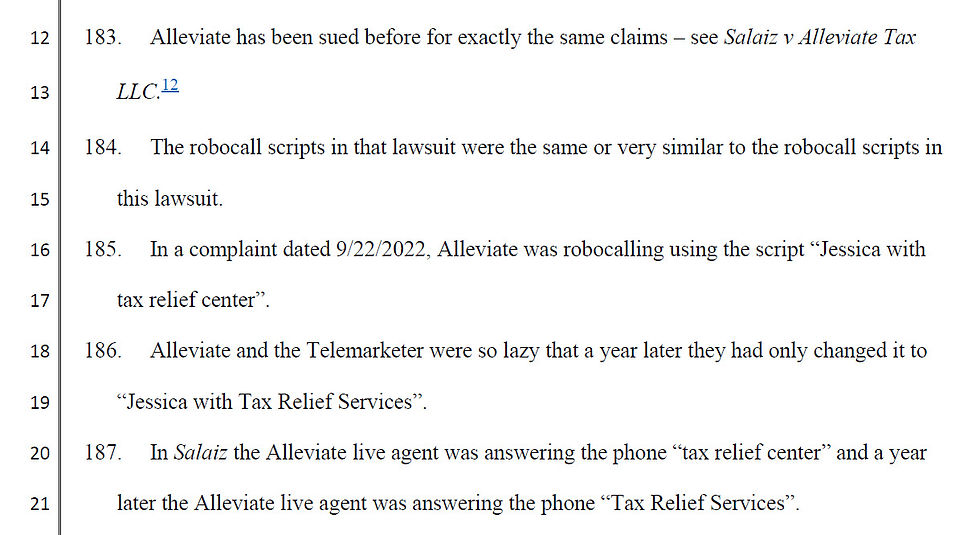Trebling your TCPA damages under 47 U.S. Code § 227 - when telemarketer's violations are willful or knowing
- Peter Schneider

- Nov 13, 2024
- 5 min read
Updated: Feb 12, 2025

We all know the TCPA's statutory damages are $500 "for each such violation" under 47 U.S. Code § 227(b)(3)(B) for robocalls, and up to $500 under 47 U.S. Code § 227(c)(5)(B). Both sections allow a tripling/trebling of the damages "If the court finds that the defendant willfully or knowingly violated the regulations prescribed under this subsection". A few simple words that Courts struggle to put a consistent meaning to. Treble damages are the punitive damages in the telemarketing world and I want you to get your triple damages when telemarketers ring your phone without consent. Different courts can have widely differing opinions on willful and knowing violations so this article is just talking about specific results and holdings in a few courts. Your court might be very different.
One of the first hang-ups is willful or knowing of what? That the call is being made? That an illegal call is being made? The Ninth Circuit expanded willful or knowing to include reckless with perhaps the best (lowest bar) definition for telemarketing:
Conduct is reckless if it "is not only a violation under a reasonable reading of the statute's terms, but shows that the company ran a risk of violating the law substantially greater than the risk associated with a reading that was merely careless." True Health Chiropractic, Inc. v. McKesson Corp., No. 22-15710, 8 (9th Cir. Oct. 25, 2023)
I like this definition because it is easier to prove this lower standard. Most telemarketers you can get your hands on probably are more reckless than knowing and willful Most illegal calls are initiated from overseas and transferred to the USA, or are initiated on behalf of the USA entity. The USA entity is hiring the oversees call center to outsource the willful or knowing violation over there.
A real example of this might be a company dialing phone numbers on the FTC's do-not-call list (because they never checked the list) and then getting sued. A judge might let them out of treble damages because they didn't know which calls were illegal, but a judge would have a more difficult time absolving them under the reckless standard. Akin to shooting a gun into the air, a resulting injury might not be willful and knowing but no judge will say it wasn't reckless.
How does getting treble damages work in real life? First is building your case for receiving them. An easier method could be asking them to stop calling, and a slightly more difficult method is finding evidence the telemarketer knew or should have known not to call.
Before awarding treble damages for any willful or knowing violations of the TCPA, a court should have evidence that a defendant was aware or should have been aware that it called an individual after he or she asked that the calls stop or that the defendant knew it was violating the TCPA but kept calling anyway. Warman v. Law Office of Daniel M. Slane, 14-CV-700(LJV), 12-13 (W.D.N.Y. Mar. 13, 2017)
Evidence the telemarketer knew or should have known not to call might be on their bbb.org business review page. Does the entity calling you have a mile long list of complaints like this?

Put it in the lawsuit! Even better, is there a response from the business showing they know about the complaint(s)? Put it in the lawsuit!

Has the person or company been sued before? Are the facts in the other lawsuits similar to yours? Put it in the lawsuit!

A request for treble TCPA damages needs to be in the complaint but if it isn't supported with sufficient facts the court may strike it as this plaintiff found out. In Koeller v. Seemplicity Security, 2024 WL 4751306 (E.D. Mo. Nov. 12, 2024), Mr. Koeller received two unwanted telemarketing calls from Seemplicity Security Inc. Keoller sued under the TCPA and asked for triple damages. Seemplicity moved to dismiss the trebled damages and the court granted it.
Thus, to have “knowingly violated” section 64.1200(c)(2), a person or entity must have known that he or it initiated a phone call and that the call was to a residential telephone subscriber who had registered his or her telephone number on the national do-not-call registry. And to have “willfully violated” section 64.1200(c)(2), a person or entity must have purposely initiated a phone call to a residential telephone subscriber who had registered his or her telephone number on the national do-not-call registry . . . Turning now to Koeller’s well-pleaded factual allegations. Koeller alleges that he received two calls from Seemplicity . . .. The first call appeared as “Spam Risk,” id. at ¶ 23, but Koeller answered it and told Seemplicity’s employee (Kevin) that he was “calling a personal number,” . Koeller, however, has not alleged any facts showing that Seemplicity knew that Koeller had registered his phone number on the national do-not-call registry. Nor has Koeller alleged any facts showing that Seemplicity purposely called a residential telephone subscriber who had registered his number on the national do-not-call registry. Thus, Koeller has not sufficiently pleaded a claim for treble damages, and the Court dismisses his treble-damages claim accordingly.
In a different jurisdiction Keoller's trebled damages request may have survived, but it is safest to show continued calling after a do not call request or to show they have a history of unwanted phone calls.
I would not count on this working for you, but in lawsuit Helmuth v Friedland & Associates, the plaintiff asked for trebled damages "because there are no allegations in the Amended Complaint to support those claims.
and the judge gave a ruling I personally had not seen before.
Treble damages are available if the violations are willful or knowing. 47 U.S.C. § 227(b)(3), (c)(5). Willful and knowing are subject to proof at trial, but at this stage, the number of calls alleged to have been made are enough to survive a motion to dismiss.
Would you like a free case review? Do you have a question or a telemarketing, debt collection, or bankruptcy case that would make a great blog article? We might even review your pro-se complaint or motion in a blog post. Email peter@nwdebtresolution.com and/or nathen@nwdebtresolution.com and we may answer it for everyone!
Are telemarketers harassing you in Washington, Oregon, or Montana? My Washington State TCPA plaintiff law practice can help, just give us a call at 206-800-6000 or email peter@nwdebtresolution.com.
The thoughts, opinions and musings of this blog are those of Peter Schneider, a consumer advocate and Washington State plaintiff's TCPA attorney at Northwest Debt Resolution, LLC. They are just that, his thoughts, opinions and musings and should be treated as such. They are not legal advice. If you are looking to file a lawsuit for TCPA violations and unwanted calls please contact me for a consultation.



Comments